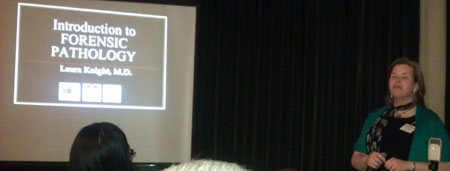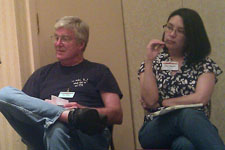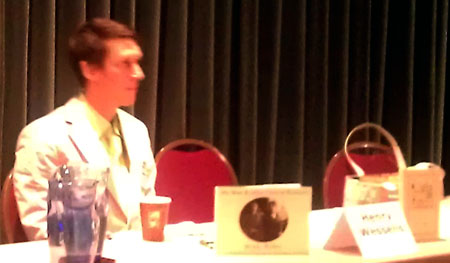Readercon 23: Saturday, July 14, 2012
Posted in Convention, Readercon, Reading on July 21st, 2012We got a late start and by the time we had breakfast and got ready to hit the panels, we’d missed the 10 am panel we wanted to see. Then in the lobby, we got into a conversation and missed the 11 am panel. But we did make it to the noon panel.
NOTE: The photos of the panelists were taken with available light from two or three rows back so are a bit grainy. I did some Photoshop work to get the panelists to stand out from the darkness. But hope you’ll get the idea of who was there. Panelist are always listed left to right from the audience point of view or as you look at the photo.

Noon: Unexamined Assumptions in SF.
Panel: Mikki Kendall, James L. Cambias (leader), Kenneth Schneyer, Darrell Schweitzer, Anil Menon.
Description: In a 2011 blog post, James Cambias complained of “[convention] attendees and panelists dusting off old, unexamined assumptions” in SF. For much of its history, SF developed a set of unexamined assumptions that became default conventions of the genre—that space exploration will move systematically outward from the moon to the planets, that the explorers will be cisgender heterosexual American or European males, that aliens will fight us in (peculiarly two-dimensional) space battles, and so on. 21st-century SF has made some notable efforts to roast these chestnuts, but it has its own set of assumptions, which this panel will mercilessly dissect and offer alternatives to.
Some questions were raised and dealt with such as: Why would you have clone slaves when born people are certainly cheaper. Why would any alien want to come all the way to Earth when whatever the book/movie/whatever gives as a reason could certainly be found in their own solar system? Schweitzer suggest the only reason would be if people of Earth tasted good making us alien sushi.
There was also a lot of talk about the economics of SF and fantasy and how they seldom, if ever, seem to apply. Why is a post apocalyptic society uniform? Shouldn’t they all be varied by which small group survived with their culture attached but changed for the harsher environment?
The thought was raised that in many SF stories they could just as easily take place without space. Why doesn’t any SF story show how we got from here to, say, the Star Trek universe where everything is peacefully one Earth government and a kind and benevolent Federation? Does the expectations of the audience fashion the story?

1:00 PM. The Autopsy, Postmortem Changes, and Decomposition: A Primer for Writers.
Speaker: Laura Knight.
Description: What happens after we die? Despite the incredible surge in popularity of forensic science in popular media, many myths and misunderstandings continue to surround the autopsy, and postmortem changes like rigor mortis and subsequent decomposition are often misrepresented. Further, medical examiners and coroners have often been depicted as insensitive and crude, eating a sandwich in one hand while wielding a bloody scalpel in the other. Dr. Laura Knight, a forensic pathologist and medical examiner, will present actual autopsy photographs, along with a non-sensational narrative description of the autopsy process and a detailed explanation of the changes to the body after death.
Dr. Knight gave an enlightening and tight presentation that actually fit in the time allotted and allowed for a short Q&A. She had a slide show to accompany her talk. She began with the difference between Coroners and Medical Examiners (M.E.), the training required for an M.E., then she went over how an actual autopsy is performed (the sequence, the standard items that are looked for, and some of the problems that arise).
The room was very warm and the pictures rather graphic. A couple of people had to leave during the talk. If any author is writing a crime story and needs to have a forensic autopsy as part of the discover of the cause of death, they would find this topic extremely helpful — It’s not like seen on CSI Anywhere.

2:00 PM. The City and the Strange.
Panel: Howard Waldrop. Ellen Kushner, Stacy Hill, Leah Bobet, Amanda Downum, Lila Garrott (leader).
Description: In The Death and Life of Great American Cities, Jane Jacobs writes, “By its nature, the metropolis provides what otherwise could be given only by traveling; namely, the strange.” N.K. Jemisin’s Inheritance trilogy demonstrates that epic-feeling fantasy can still take place entirely within the confines of a single city. Fictional metropolises such as Jeff VanderMeer’s Ambergris, China Miéville’s New Crobuzon, and Catherynne M. Valente’s Palimpsest are entire worlds in themselves, and the fantasy cities of Lankmar and Ankh-Morkpork shine as centers of intrigue and adventure. In what other works, and other ways, can cities be stand-ins for the lengthy traveling quest of Tolkienesque fantasy?
The panelists talked about some of the differences between real cities and made up cities. Made up cities must have a feeling to the reading of a history of culture and they need to work. Real cities are not homogenous they have small pockets or neighborhoods that vary from those neighborhoods that surround them. It was agreed that some of this information could be supplied via impressions rather than specific information.
Someone on the panel said they remembered a quote that, I paraphrase from my notes, “the city is where you go to meet people you don’t know and aren’t related to.”
Further discussion centered on hidden world cities or 2nd world cities in fantasy and the city as a wilderness or unknown territory as much as the country setting could be unknown territory.


3:00 PM. Theories of Reading and Their Potential Insights into Fantastika.
Panel: Shira Daemon, Eric M. Van, Gayle Surrette, John H. Stevens (leader/speaker), Suzy McKee Charnas, Rick Wilber, Kate Nepveu.
Description: We talk about reading at Readercon every year, but we rarely talk about our understanding of reading as a mental process of cultural practice. John H. Stevens will summarize some recent theories of reading from neurological, psychological, anthropological, and literary perspectives, followed by a discussion about what these ideas might be able to tell us about how we engage, interpret, and codify fantastic literature. In what ways is fantastika read like any other sort of text, and in what ways might we read (and write?) it differently?
I was on this panel but as with the other panelist, just got to listen to John’s presentation from a front row seat. The top photo above were the three of us to the left of John Stevens from the audience point of view and the smaller photo are the panelists to the right of Stevens. Unfortunately, Suzy McKee Charnas was directly behind Stevens from where my husband was sitting so doesn’t show in the photo.
John’s talk took up the entire time for the panel since there were several questions from the audience. His material is fascinating and he’s writing a book on the topic covering theories of reading from several different disciplines — anthropology, sociology, and neurology. He’s also been blogging about his research and musing on SF Signal in his column The Bellowing Ogre.
Visit to the Book Dealers Room:
One of the wonderful things about Readercon is that they have only book sellers in their Dealers’ Room. Unfortunately, even though I review books, I also buy a goodly number of books. I also love looking at the covers of books that I’ve only see the advanced reader copy of — and most of the time with no cover art.
Then we met friends for dinner and catching up on what panels they went to while at Readercon.

8:00 PM. Critical Fictions & Other Fabulous Beasts; or, Learning to Read and Write All Over Again.
Speaker: Henry Wessells.
Description: You think you know how to read? This look at critical fictions and other modes of reading/writing will suggest that it might be time to learn it all over again. The critical fiction is a piece of fiction or poetry where form (story) and content (critical function) are inseparable, a work of art that explicitly declares itself as a critique of another work of literature and explicitly makes use of that earlier source text. Henry Wessells will cover the precursors, techniques, and current practitioners of the critical fiction, and tell you why. Is it literary mash-up for people who shudder at Pride and Prejudice and Zombies? Come find out. See the suggested reading list at http://criticalfiction.net/readinglist.html.
I was excited by the topic description but rather disappointed in the actual lecture. The room was warm and Mr. Wessells read several poems and a short story, as well as an introduction to a book. The introduction he read might have been more interesting if it had been pared down to the part essential to forming a definition of ‘critical fiction’ rather than so centered on the one author and book. I totally fail to see the difference between critical fiction, homages, and pastiches. When asked about this he said it depended on the author’s intent, guess that’s a great reason to read the introductions and forwards to books and stories — to get a heads up from the author.
I plan to check out the link to the suggested reading list, since I’m sure that my failure to grasp what Wessells was more on my side than his due to the hour and the temperature of the room. Any one interested in the topic based on the description should check out the site listed in the description.
We then called it a night but on the way to our room got folded into a conversation in the lobby — thus another late night for us.



